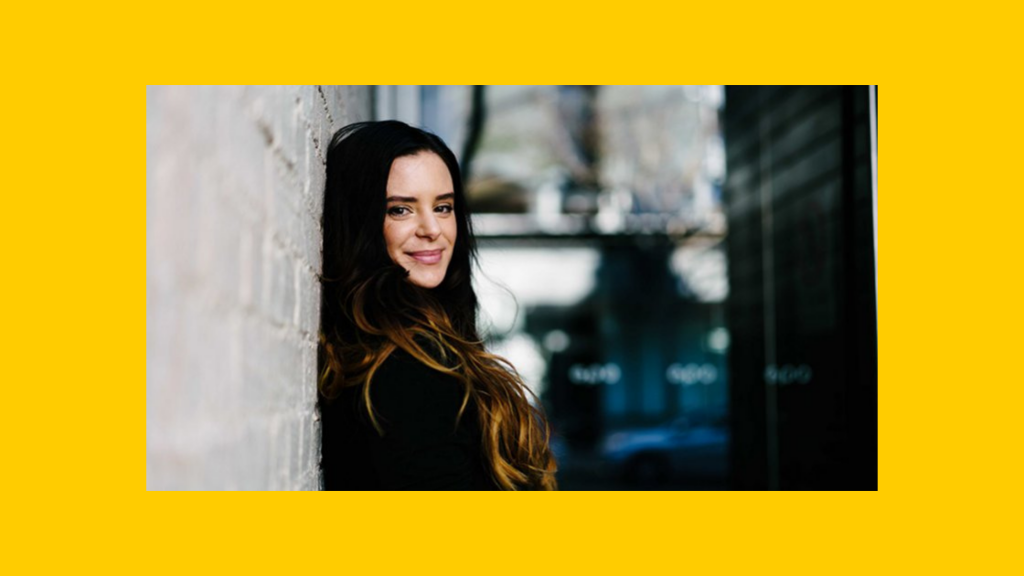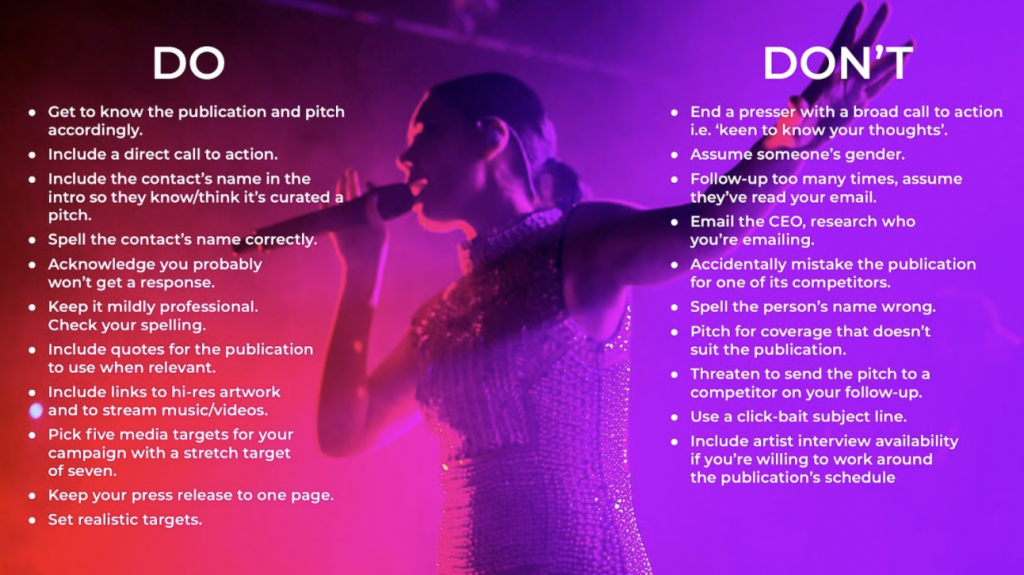
Do you ever find yourself wondering why you might not be hearing back from media on emails? Wondering if your music has been lost in the ether?
First of all, you’re not alone. A large part of our job as music publicists is chasing up emails and establishing and maintaining good relationships with media outlets and other members of the industry – largely – online.
Still, it can be frustrating to wonder if you’re being heard above the fray. Not long ago, we learned some more about the journalist’s point of view and now we’re moving up a notch to find out the do’s and don’ts of pitching to media.
Enter: Poppy Reid.
She is the Managing Editor of The Brag’s network whose titles include Tonedeaf, Don’t Bore Us The Brag, The Industry Observer, Rolling Stone Australia and an impressive partnership with PMC (Billboard, Variety, The Hollywood Reporter) so when it comes to working with music publicists and artists, she knows a thing or two.
Having worked in the music industry for some time now, Poppy has learned about being serviced and plugged new music, working with musicians and the nuances of music PR as well.
She tells us a bit about her experiences and how artists and music publicists can get the best out of their interactions with her, working with one of Australia’s largest media networks.
Biggest misconception people might have about your day to day role?
That I do so much of what is actually a collaborative effort. I often get asked, “How do you fit in all the work, and work across so many titles?”, and while it’s true that time is my greatest enemy and I do get a lot done across any one day, I don’t do it all alone.
From our News Editor Geordie, to our Head of Observer Raidy and our Rolling Stone Australia Editor Tyler, so much of what I do was created with their help.
What’s been your biggest professional challenge to overcome last year?
My role is to support the team and make sure they have the resources and time to do their roles.
While I loved working from home for a whole chunk of 2020 (and I mean, I REALLY loved it… That six second commute to my desk in my sweatpants was a dream), it was harder to ensure everyone felt supported.
Zoom is great and all, but nothing beats the casualness of a face to face meeting over food. Sydney was quite lucky in that our staff here didn’t have such a prolonged lockdown period, so I’ve been able to catch up in person a lot with our Sydney Braggers.
As for our Melbourne staff, let’s just say thank goodness for work trips that take me there every now and again, and the Rolling Stone Australia Awards in March this year, which went off!
What has been driving you in your work this year. Do you find it hard to balance being creative with your business?
Writing about things that matter to me and our readers is what drives me. One of my 2021 goals was to write an in-depth piece about a topic that is truly meaningful. I think I’ve written a few this year so far.
My piece on how Kiwi artists are naturalising Māori culture and language through music (out in the June issue of Rolling Stone Australia) and an investigative piece for The Industry Observer titled Four women allege rape and assault as new research shows breadth of Australian music’s #MeToo plight.
Our business is the most creative space I’ve ever been in. We’ve maintained our start-up mentality when it comes to systems, processes, and new projects. No idea isn’t entertained, in fact, they’re really encouraged.
We always say we’re building the plane while flying and honestly, we’ll never finish building it.
You’ve been working with artists, media and publicists for some time now. What do you enjoy the most about the process?
I love the privilege that comes with telling a person’s story. I find people so fascinating and I love helping people tell their stories. For me, there’s no one more fascinating than a musician.
Artists have a few ways of communicating their art to fans, whether it’s their music, their visuals, their live show, or via their social media.
I like to think a longform article helps tell their story in a way they’re not quite able to. There’s a huge responsibility that comes with that though, I definitely don’t take it lightly.
Where do you think people trip up the most when it comes to pitching ideas / coverage to you?
Here’s a list of Dos and Don’ts that I prepared earlier:

What’s the easiest thing one can remember when it comes to creating a successful pitch to media?
Do your research and curate your pitch! You wouldn’t pitch an EDM artist to a hip hop publication; a little homework on the title you’re pitching to goes a long way.
For example, Rolling Stone doesn’t publish music Premieres, but we do have a regular column called Song You Need To Know.
If you were wanting coverage on your single and you pitched for a Song You Need To Know on Rolling Stone, we know you’ve done your research, so you’ve just earned a few brownie points with us.
I will say though, we always look at the strength of the song and the likeliness of our readers liking it based on their past behaviour – the cream always rises to the top as they say!
Do you think one bad pitch can permanently put a block up against an artist’s name in the future?
Absolutely not. I don’t think there’s anything that could put a permanent block against an artist on The Brag Media.
How do you find your approach to running a successful publication while still supporting emerging artists has changed in the last 12-24 months?
Every section of our business has KPI targets, which we all collaborate on to achieve.
The sure-fire way of hitting our content KPIs is to ignore all emerging artist pitches, which we could just never do.
The Brag Media is what it is because of the support of emerging artists and because we are inspired by them every day.
What would this industry be if sites like Tone Deaf didn’t support acts like Birds of Tokyo and The Jezabels, or if The Music and Music Feeds didn’t champion Skegss and Flume?
Supporting emerging talent is important to us, and even with our current editorial capacity, we publish 3-4 interview features a week with upcoming acts.
What’s exciting you about Australian music right now?
There seems to be a cultural shift happening right now.
Thanks to the strength of those who have come forward with their #MeToo stories, Instagram accounts like Beneath The Glass Ceiling, shows like The Project, and publications like Stuff.co.nz and Sydney Morning Herald, the music industry is under a very close microscope.
I know industry bodies and representatives are working hard behind the scenes to make it a safer, more inclusive space for all, and that makes me want to jump up and high-five the sun! (Not that I would even if given the option, I need my hands to do my job…).
